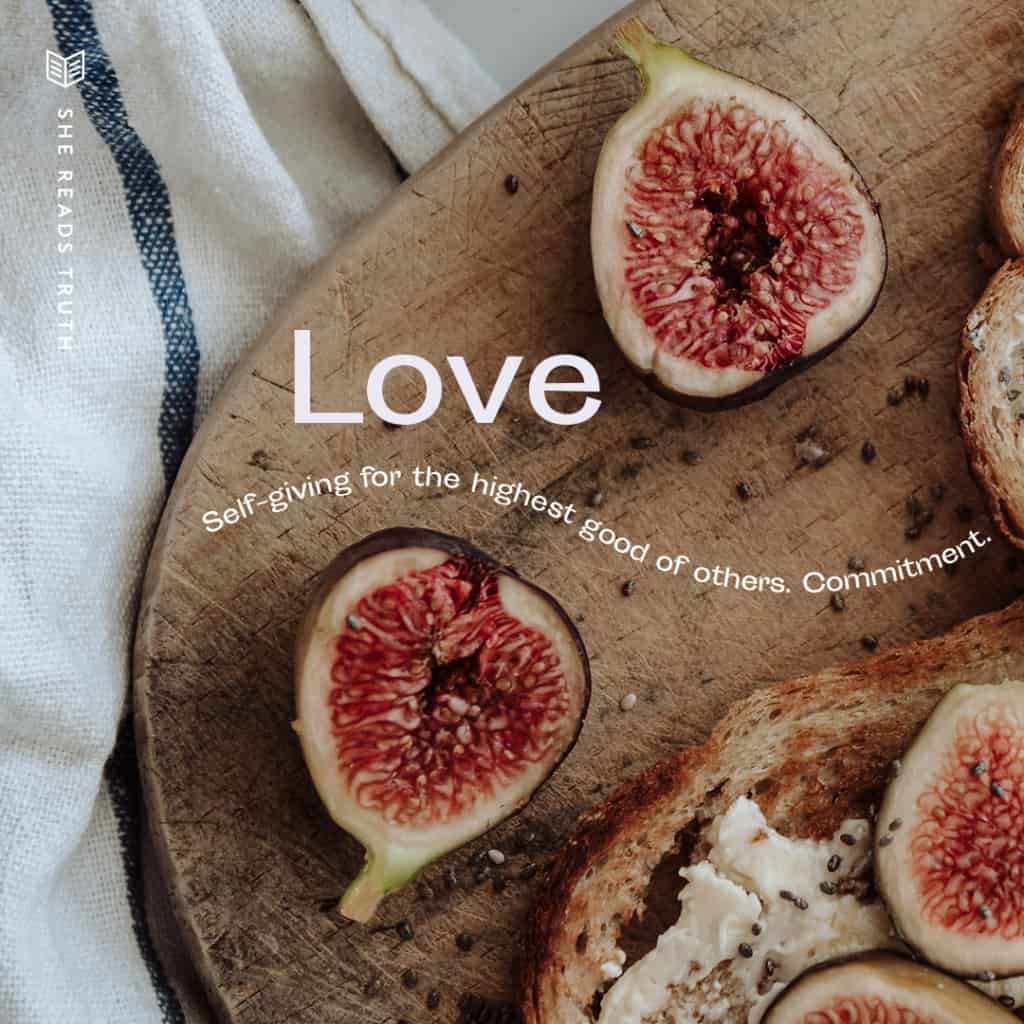Love
Open Your Bible
Deuteronomy 4:31-38, 1 Corinthians 13:1-13, Galatians 5:6, Galatians 5:13-14, 1 John 4:7-21
BY Jen Yokel
Of all the aspects of the fruit of the Spirit, love feels like the most universal and, somehow, the most elusive. If you’ve ever tried to explain what it’s like, you know what I mean. Love can feel like analyzing every word of every conversation between meeting someone and confessing your feelings. It can feel like the comfortable silence of deep friendship. It can feel like filling your Instagram feed with pictures of a new baby, or late-night scrolling through photographic memories of a faraway friend. We write songs about it, cry while watching movies that try to portray it, maybe even try to deny it, declaring it a lie when our hearts are broken.
But Scripture tells us that the true definition of love is found in who God is. In fact, it’s one of the surest things we can know about God, a virtue greater than even faith and hope (1Corinthians 13:13). Scripture tells us “God is love, and the one who remains in love remains in God, and God remains in him” (1John 4:16).
The famous “love chapter” of 1 Corinthians 13 outlines many attributes of this love: patience, kindness, not insisting on its own way, rejoicing in truth, hoping and enduring everything. Enduring wars and disease and hatred. Outlasting empires and buildings and movements. In this litany of love’s attributes, I see the face of God. I hear God’s invitation to make ourselves at home in this love and let it transform us through the indwelling Holy Spirit.
This sort of love is nonsensical, if you think about it. It isn’t a vague, obligatory love for people who are like you, and it goes beyond the bonds of family, friends, or spouse. This love extends the circle wider and wider, transcending rational thought about who is worthy of love; it persists no matter what and in any circumstance, without condition.
The apostle Paul said, “The whole law is fulfilled in one statement: Love your neighbor as yourself” (Galatians 5:14). What could that look like today, as we imitate Christ to seek the welfare of our neighbors? When we make ourselves at home in God’s transformative love, we are changed. We are empowered to join God in repairing the world, to press on and show our neighbors what we value and to whom we belong.
“You were called to be free, brothers and sisters; only don’t use this freedom as an opportunity for the flesh, but serve one another through love” (Galatians 5:13). May it be so in us, the Holy Spirit growing love in our hearts for the flourishing of our families, our neighbors, and all of creation.

122 thoughts on "Love"
-
☝️
-
This. I can say the word a thousand times a day, but do I really show it in my words and my actions and my attitude. Rarely. The Holy Spirit is constantly reminding me to have these fruits and telling me when I haven’t shown them.
-
Love does not insist on its own way! I truly desire to live this truth
-
We are called to be free!
-
Everytime I come across something talking about love I’m reminded of the Greeks and all their definitions. Love encompassed all aspects of their relationships but when they said “I love you” it in lied something different
-
I am soooo not perfect when it comes to showing love but it blows my mind how many Christians today don’t even recognize this as how we should aspire to be. I feel like this is why so many people have a bad perception of Christianity l, because we do not practice this enough as a whole. Jesus surrounded himself with prostitutes, tax collectors and other sinners but that doesn’t mean he approved of their sin. We are so quick to shut out the LGBTQ community or drug addicts or anyone different but wouldn’t it be so much more effective to show them our God through loving them.
-
I hope I can catch myself before being short with someone I dislike or saying something unkind about them and say to myself “they are worthy of love” before I act.
-
I totally resonate with this. I think the way I have looked at love for those who have hurt me in the past, has been almost “weakness” in a sense… like if I love someone who has hurt me, does that give them the ability to continue to hurt me or take advantage of me? I think that comes from a worldly view of what love is, but to read what God says love is is so helpful! I’ve had to learn to set really good boundaries with the people who have hurt me in the past and I think that’s a great way of loving them but not allowing them to continue. But I agree it can be so hard still for me to know how to fully love someone that continues to deeply hurt me.



Post Comments (122)